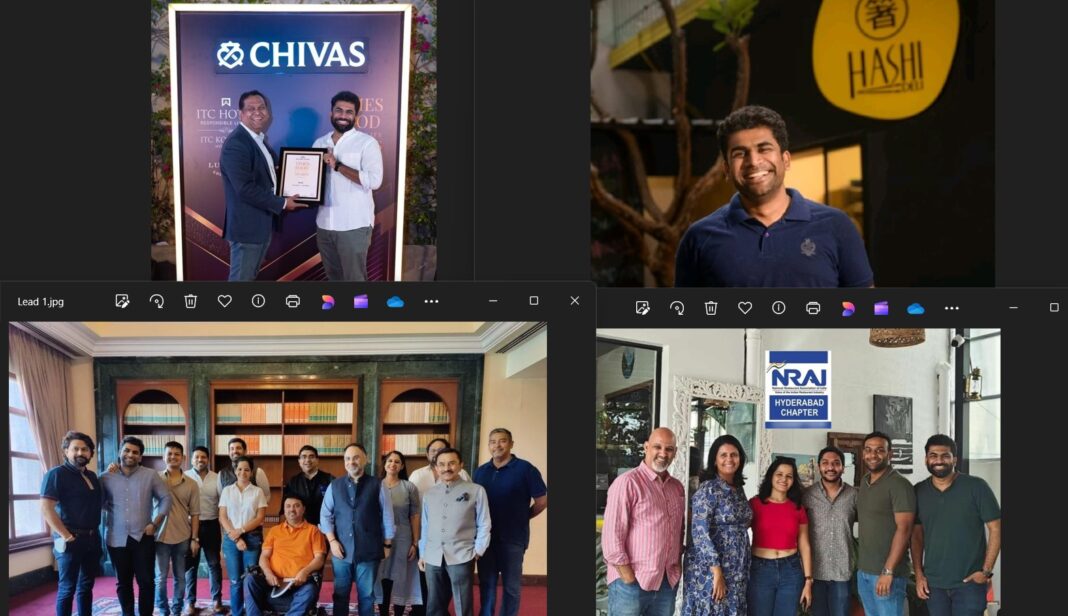The National Restaurant Association of India aims to lead the Indian restaurant industry to greater profitable growth. Sandeep Balasubramanian, the co-chapter head of NRAI, speaks to The Pioneer as he discusses the aim and objective of the association.
Aarti Sreenath
As the leading association representing the Indian restaurant industry, NRAI aims to develop and strengthen the Indian food service sector. For our special segment of Community Wise, The Pioneer connects with Sandeep Balasubramanian, the co-chapter (Hyderabad) head of the association, sharing his experiences, lessons learned and the vision that drives his current endeavours.
His journey is marked by notable stints at Red Bull India and Pernod Ricard India before venturing into the restaurant business. Now, as a prominent figure in Hyderabad’s culinary scene, he shares his experiences, lessons learned and the vision that drives his current endeavours.
As the co-chapter head of NRAI Hyderabad, his responsibilities include representing the restaurant industry and addressing its challenges. “The objective is to give a voice to the industry, which is often misrepresented despite its significant economic contribution,” he states. The restaurant industry contributes 2% to the GDP and GST revenue of the country and it indirectly supports numerous jobs through delivery services and other associated sectors. NRAI Hyderabad has launched several initiatives, including the first-ever Indian Food Services Report (IFSR) for Hyderabad, highlighting the industry’s impact.
Under his leadership, NRAI Hyderabad has focused on engaging with stakeholders and consumers to improve the restaurant industry. They organised the first-ever Indian Restaurant Conclave in Hyderabad in 2021, setting a benchmark for the industry. This event brought together business owners, employees, vendors and potential partners to discuss challenges, employment, hygiene and collaboration. “We emphasised the importance of collective efforts in addressing issues and advancing the industry,” Sandeep highlights.
The association promotes local restaurants and food businesses through networking and collective activities. They collaborate with partners from various sectors, including cloud kitchens, cafes, bars and vendors supplying packaging materials and kitchen equipment. Regular events and activities, such as Iftar parties and CSR initiatives, provide visibility and support to members. “These efforts foster a sense of community and collaboration within the industry,” he notes.
One significant trend in Hyderabad is the rapid increase in the number of F&B outlets. However, this growth poses challenges, particularly in terms of staffing. To address this, the chapter launched “Mission Kaam,” an initiative to train underprivileged individuals and transform them into skilled labor for the F&B industry. “This program aims to bridge the gap between supply and demand by providing employment opportunities to those in need,” he explains.
The director highlighted the substantial economic contribution of the F&B industry in Hyderabad. With a market value of 10,700 crore, Hyderabad ranks as the sixth-largest F&B market in India. “The city’s young and cosmopolitan population presents significant growth opportunities for the industry,” he says. The diverse employment generated by restaurants, from housekeeping to kitchen staff, supports the local economy. He believes that as the industry grows, its contribution to the economy will continue to expand.
Community outreach is a vital aspect of the NRAI’s vision. Through CSR initiatives, they ensure that underprivileged communities and NGOs receive regular food donations. Collaborations with organisations like the Roti Bank facilitate food distribution during festivals, emergencies and disasters. Additionally, they conducted a blood donation camp to support thalassemia patients, demonstrating their commitment to social responsibility. Mission Kaam also plays a crucial role in training and upskilling underprivileged individuals, integrating them into the F&B industry,” he emphasises.
The founder concludes on the call for collective effort in the F&B industry. “We emphasise the importance of networking, addressing challenges and working together to improve the industry,” he states.
He believes that a shift in consumer mindset towards quality will lead to healthier dining choices and a more sustainable industry.




